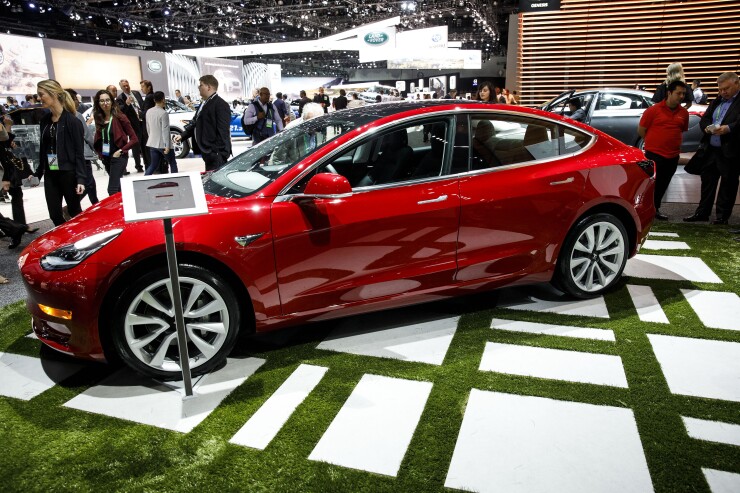Investors snapping up Tesla’s initial offering of bonds backed by leases on electric cars had to consider some unusual risks.
The bonds are backed both by lease payments and the resale value of cars coming off lease. And it’s unclear how robust of a market there is for used battery electric vehicles. The limited range of these cars limits the potential pool of buyers. And it’s always possible that advances in battery technology will make them obsolete.
Then there’s Tesla’s big bet on the Model 3. The $540 million of bonds sold this week are backed by leases on Tesla’s existing premium Model S sedans and Model X sport utility vehicles; but the company has plans for unprecedented ramp-up in the production and sales of the newly launched Model 3, a car aimed at the mass market. This increases the risk that it might not be in a position to keep servicing existing leases.
None of this seemed to weigh too heavily on investors’ minds, however. The market for bonds backed by auto loans and leases is deep and liquid, and spreads are tight. To many, a deal with a few idiosyncrasies just offers a chance to pick up a little extra yield.

“At the end of the day, it’s an auto lease deal,” said Gil Libling, a portfolio manager at Semper Capital. “It just happens to be Tesla.”
Libling said that whether Tesla succeeds in its other ventures is a lesser concern, since Semper looks at deals on a pool-by-pool basis.
“They are unique cars, but [bonds backed by car leases] do trade actively,” he said. “You can look at general prices, or at certain cohorts of cars, and get some comfort as to collateral performance over time.”
To be sure, the credit quality of lessees for the Model S and Model X is high. In its presale report on the deal, Moody's Investors Service noted that the weighted average FICO score of the leases used as collateral is 767. That's lower than that of the auto lease pools securitized by BMW and Mercedes-Benz, which have weighted average FICO scores of around 780, but still high compared with other recent lease pools securitized by Ford, Nissan and Hyundai. (Moody's was the only rating agency engaged by Tesla.)
“It’s also a pretty short-dated paper,” Libling said. He noted that the leases have original terms of two or three years, and many in this initial pool are seasoned. “That can mitigate some liquidity concerns.”
Still, Tesla had to pay up to secure an AAA for its deal from Moody’s, providing higher levels of investor protections than did BMW or Mercedes-Benz.
The senior tranche of notes benefits from 31.25% credit enhancement, consisting of overcollateralization of 10.20% of the initial pool balance, which will increase to a target of 12.20% of the initial pool balance; a nondeclining reserve fund of 0.75% of the initial pool balance; and 20.30% in subordinated notes.
By comparison, credit enhancement was much lower for the most recent luxury auto-lease securitizations for the U.S. captive finance arms for BMW AG (15.65%) and Daimler AG’s Mercedes-Benz (14.5%).
Moody’s only expects 0.5% of the leases in the pool of leases backing Tesla’s deal to default over the life of the transaction, but it has sharply discounted the residual value of any repossessed vehicles.
In its resale report, the rating agency noted that Tesla controls the remarketing process for off-lease vehicles and only a very small amount of Tesla vehicles have been sold at auction. “As a result, retail used vehicle values, rather than auction wholesale values such as the NADA auction data, account for most of the performance data,” the report states, referring to the National Automobile Dealers Association. “The wholesale value of used vehicles tends to be lower than the retail value.”
Tesla has data on only 4,344 used Model S and Model X vehicles sold in 2017 as of Nov. 30, 2017.
Other manufacturers, including Ford, Nissan and Hyundai,
The auto ABS market is off to a strong start this year, with some $16 billion of bonds backed by loans, leases and rental cars in January, according to S&P Global Ratings. In a report published this week, it noted that quite a few deals have been upsized.
By comparison, auto ABS issuance in January of 2016 and 2017 totaled $7 billion apiece.





